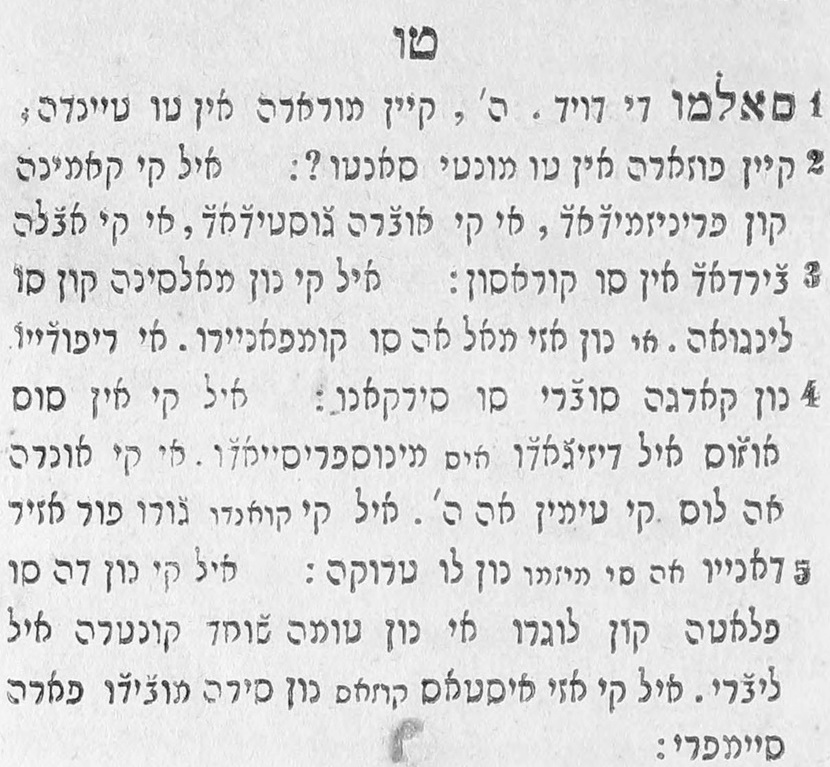Contributor(s): Shared on: Categories: Tags: | Source (Hebrew) | Translation (English) |
|---|
מִזְמוֹר לְדָוִד.
|
A Song of David. |
יהוה, מִי יָגוּר בְּאָהֳלֶךָ,
מִי יִשְׁכֹּן בְּהַר קָדְשֶׁךָ׃
|
YHVH, who may live in Your house?
Who may dwell on Your holy mountain? |
הוֹלֵךְ תָּמִים וּפֹעֵל צֶדֶק
וְדֹבֵר אֱמֶת בִּלְבָבוֹ׃
לֹא־רָגַל עַל לְשֹׁנוֺ,
לֹא־עָשָֹה לְרֵעֵהוּ רָעָה, וְחֶרְפָּה
לֹא־נָשָֹא עַל קְרֹבוֹ׃
נִבְזֶה בְּעֵינָיו נִמְאָס
וְאֶת־יִרְאֵי יהוה יְכַבֵּד,
נִשְׁבַּע לְהָרַע וְלֹא יָמִר׃
כַּסְפּוֹ לֹא־נָתַן בְּנֶשֶׁךְ
וְשֹׁחַד עַל־נָקִי לֹא לָקָח,
|
Those who are upright; who do justly;
They speak the truth within their hearts.
They do not slander others, or wrong them,
Or bring shame upon them.
They have contempt for the lawless,
And honor those who revere the YHVH
They give their word, and, do not retract.
They do not exploit others,
they never take bribes. |
עֹשֵׂה־אֵלֶּה לֹא יִמּוֹט לְעוֹלם:
|
Those who act this way shall never be shaken. |
This translation of Psalms 15 can be found in HaAvodah SheBaLev – the Service of the Heart (Kehilat Kol HaNeshama, Jerusalem, 2007). “Adonai” is used as a circumlocution for the Tetragrammaton in the English translation. I have replaced ‘Adonai’ with ‘YHVH.’ –Aharon Varady. Source(s)
Rabbi Efrat Rotem was ordained through the Hebrew Union College in Jerusalem in 2015. She served as the rabbi of Kehilat HaLev in central Tel Aviv, a member congregation of the Daniel Centers for Progressive Judaism. She also designed and taught courses and seminars on her rabbinical outlook, which integrates pluralist Judaism, critical feminism, and queer identity and worldview. She holds an MA in Literature from Tel Aviv University and has translated texts from English to Hebrew. She also studied Creative Writing at Haifa University. Levi Weiman-Kelman is the founding rabbi of Congregation Kol Haneshama, a Reform community in Jerusalem devoted to prayer, study and social action. He is a founding member of Rabbis for Human Rights and teaches at the Hebrew Union College. The Mesorah (Heb: מָסוֹרָה) a/k/a, the Masoretic text is the authoritative Hebrew and Aramaic text of the TaNaKh for Karaite and Rabbinic Judaism. It was primarily copied, edited and distributed by a group of Jews known as the Masoretes between the 7th and 10th centuries CE. The Masoretic Text defines the Jewish canon and its precise letter-text, with its vocalization and accentuation known as the Masorah. David ben Yishai was the second king of the United Kingdom of Israel and Judah, reigning ca. 1010–970 BCE. While almost half of the Psalms are headed "l'David" and tradition identifies several with specific events in David’s life (e.g., Psalms № 3, 7, 18, 34, 51, 52, 54, 56, 57, 59, 60, 63 and 142), most scholars consider these headings to be late additions and that no psalm can be attributed to David with certainty. 1 Samuel 16:15-18 describes David as a skillful harp (lyre) player and "the sweet psalmist of Israel." Read a comment / Leave a comment (moderated) Works of related interest: |







Leave a Reply